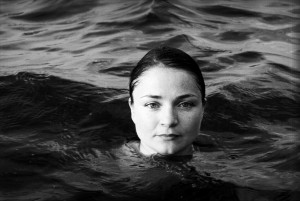Erkki-Sven Tüür and the New Tallinn Trio at the Phillips Collection
By Stephen Brookes • The Washington Post • February 26, 2011
Arvo Pärt may be the most celebrated composer to come out of Estonia, but to judge by a riveting concert at the Phillips Collection on Thursday night, the place is a smallish hotbed of serious musical talent. Erkki-Sven TüürTake, for instance, the composer Erkki-Sven Tüür, whose chamber music was the focus of the evening. Spare, probing, intense and extraordinarily characterful, Tuur's compositions work on an almost physical level, using insistent gestures to build structures of sound that are both powerful and deeply moving - and even, in the case of the final piece, downright exalting.
Erkki-Sven TüürTake, for instance, the composer Erkki-Sven Tüür, whose chamber music was the focus of the evening. Spare, probing, intense and extraordinarily characterful, Tuur's compositions work on an almost physical level, using insistent gestures to build structures of sound that are both powerful and deeply moving - and even, in the case of the final piece, downright exalting.
And Tüür couldn't ask for more committed interpreters than the New Tallinn Trio, superb Estonian musicians who turned in ear-searing playing throughout the evening. The concert (part of the Phillips's "Leading European Composers" series) opened with the trio "Architectonics VII," and many of the hallmarks of Tüür's music were quickly apparent. Evocative and unabashedly expressive, even playful, it spoke a modern but completely accessible language in which melody was never far from the surface, building repeated gestures and phrases into a powerhouse of momentum that was nothing less than exhilarating. That also held true in "Conversio," for violin and piano, a lighter and more delicate work - you were reminded of birds flying in a gusty wind - that developed into a wonderful perpetuum mobile before dissolving into fragments. Helena TulveThe lovely and almost pastoral "Dedication," for cello and piano, was full of yearning, though"Synergie," for violin and cello, seemed more academic and less satisfyingly natural than Tüür's other works. Another Estonian composer, Helena Tulve, was represented with "Lumineux/Opaque." Tulve is clearly fascinated with long, sustained sonorities; she builds colorful masses of sound and slides them into each other, and it was an intriguing, poetic work - even if all the glissando-ing had you reaching for the Dramamine at times. But the most purely beautiful music of the evening came at its close, with Tüür's "Fata Morgana," a work that, like the mirage it is named for, drew you in with shimmering, irresistible allure.
Helena TulveThe lovely and almost pastoral "Dedication," for cello and piano, was full of yearning, though"Synergie," for violin and cello, seemed more academic and less satisfyingly natural than Tüür's other works. Another Estonian composer, Helena Tulve, was represented with "Lumineux/Opaque." Tulve is clearly fascinated with long, sustained sonorities; she builds colorful masses of sound and slides them into each other, and it was an intriguing, poetic work - even if all the glissando-ing had you reaching for the Dramamine at times. But the most purely beautiful music of the evening came at its close, with Tüür's "Fata Morgana," a work that, like the mirage it is named for, drew you in with shimmering, irresistible allure.


Reader Comments